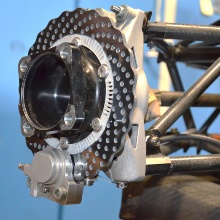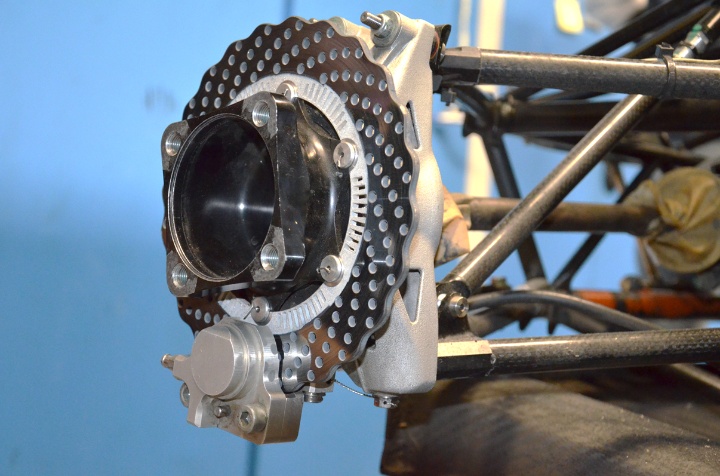The Institute for Manufacturing Technologies of Ceramic Components and Composites (IFKB) at the University of Stuttgart has developed a new high-performance brake disc concept. The brakes have three key advantages. They are particularly light, perform better, and are more environmentally friendly. Furthermore, they are particularly attractive for electric vehicles. The student racing team at the University of Stuttgart now uses the new brakes in its race car and has already broken records. There are now plans to use the brakes in a series-produced car.
What is special about the new brake discs is the ceramic coating. Together with his colleagues at the institute headed by Prof. Rainer Gadow, project leader Septimiu Popa has developed a brake disc concept using a layered composite coating. This consists of an aluminum basic rotor, whose friction surfaces are equipped with a highly wear-resistant ceramic coating. Through the use of this coating, the team has been able to stop excess wear and tear to the aluminum alloy and so make it possible to use this lightweight material at all. The researchers are currently carrying out tests with a German car manufacturer, with an eye to using it as standard in road cars.
A big advantage of the brake disc concept is that it is more environmentally friendly than previous brakes. “More than 50 percent of the fine dust particles emitted by vehicles come from tire and brake abrasion instead of exhaust fumes”, explains the project leader. The research team has managed to reduce this brake abrasion by using the special ceramic coating. As a result, the vehicles have significantly reduced their emissions of fine dust particles. The relevant measurements were carried out by a team led by Popa working in cooperation with the German Aerospace Center (DLR).
The researchers have also been able to optimize the braking performance. The responsiveness has been improved, the friction coefficients have increased and the braking pressure has been maximized. “The driver always gets the same feeling throughout when braking. Thanks to the thermal spray coating, the braking point doesn't get displaced depending on the temperature”, says Popa.
Brakes are attractive for electric vehicles
The lightweight brake discs are also very interesting for future hybrid and fully electric vehicles. Due to the recovery of braking energy, the mechanical brakes are used less often here. Due to the lack of cleansing power of the friction, traditional brake disc materials such as gray cast iron are prone to strong corrosion effects. Alongside the unaesthetic look, a build-up of rust can lead to the braking function becoming critically impaired, especially in emergencies. This problem is completely solved by using the corrosion-resistant ceramic surface.
The lightweight aspect is also very important in motorsports. In motorsports, being able to quickly accelerate and decelerate large masses is critical. The racing team at the University of Stuttgart is already into its third season using the newly developed braking system, which has already been very successful. It has been possible to save a total of 1.2 kilograms of unsprung mass. “This corresponds to a reduction of 60 percent of the weight of the discs compared to a system from 2015”, explains Popa. In June 2019, the racing team came first at the Formula Student competition in Michigan for the fourth time in a row. “That’s a world record”, says Popa. “We’re happy to be able to support the racing team in all their hard work. The results from their measurement data has also helped us a lot in developing the brake disc concept.” A brake disc concept for which the team has won the “Brake Design Award”.
Popa and his colleagues have also been able to solve another problem. The brakes are prevented from overheating, with the attrition that causes, thanks to an intelligent cooling architecture and the tailor-made thermodynamic properties of the brake discs.
Expert Contact:
Septimiu Popa, Institute for Manufacturing Technologies of Ceramic Components and Composites (IFKB), Allmandring 7b, 70569 Stuttgart, T +49 711 685-68229, e-mail



